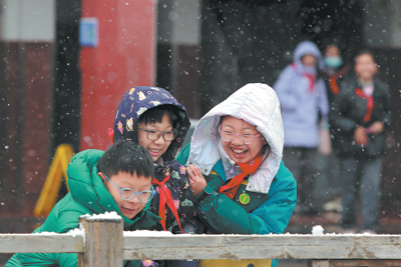Better air quality cuts into sales of masks, purifiers
By Hou Liqiang | China Daily | Updated: 2018-01-04 09:11
Sales of face masks and air purifiers - two of the hottest products last winter - have fallen this year as the air quality in northern China has improved.
In Beijing, the average concentration of PM 2.5 - hazardous fine particulate matter - decreased last year by 20.5 percent year-on-year to 58 micrograms per cubic meter.
Regions surrounding the capital have also seen improvements in air quality.
The Ministry of Environmental Protection released an action plan in late August and listed detailed targets, controlling measures and punishments in Beijing, Tianjin and 26 cities in the smog-plagued provinces of Hebei, Shandong, Henan and Shanxi.
In November, the average PM2.5 concentration in the 28 cities stood at 68 mcg/cu m, down by 37 percent year-on-year.
Shi Baoqing, who works for an insurance company in Beijing, said wearing a mask is not as necessary this winter as it was previously.
"I bought 50 masks last winter and there are still about 20 left," the 36-year-old said. "This winter, I wore masks mostly because I didn't want to see the masks left there unused and wasted."
One of his friends also gave him more than 10 masks, as his company handed out more than he could use. He added that he has also not used his air purifier yet this winter.
Zhu Jiagang works in Beijing as an agent for Honeywell and 3M, two major brands of face masks and air purifiers in the Chinese market. He said business has been affected by the decline in demand.
His company mainly sells air purification systems for offices, but it also supplies air purifiers for home use as well as face masks. It still has about 200 air purifiers for home use in stock, he said.
"The decline in sales is because of the continued improvement in air quality. Meanwhile, many dealers have entered the market, making the competition fierce," he added.
Cheng Xiqing, marketing director of Haocaimao, an online purchasing platform based in Guangzhou, said its sales of masks declined by 50 percent from last year.
"Many dealers stocked masks last summer and planned to sell them this winter. They didn't expect that the demand would slide so much," he told chinanews.com.
Some dealers failed to find buyers even at prices below cost, which is in stark contrast to last year when dealers had to line up to get products from factories, he said.
houliqiang@chinadaily.com.cn
























